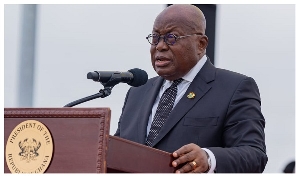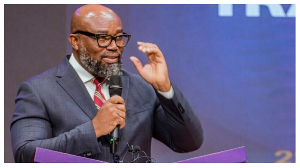Ghana's democracy is based on the principles of separation of powers and the independence of government institutions. The president's role, as the head of the executive arm of government is to respect the independence of the legislative and judiciary arms of government and uphold the roles of the other constitutional bodies to ensure a healthy democracy and a peaceful nation.
However, there have been instances where President Akufo Addo has sought to exert influence over independent institutions, such as the judiciary, the legislative, electoral commission, and anti-corruption agencies. This interference undermines the checks and balances necessary for a functioning democracy.
1. In 2018, the president attempted and succeeded in removing the electoral commissioner and her deputies from office, an action described by the international community and civil society groups as an a-front to principles of democracy.
2. Under the presidency of President Nana Akufo Addo/Bawumia government, the once vibrant media landscape has been tamed into submission to the will of the government of the day. Only a few media practitioners are bold enough to speak truth to power, sometimes to the detriment of their lives. Ahmed Suale, an investigative journalist was murdered in cold blood under bizarre circumstances. Many journalists had had to run for their lives under the presidency of a so-called human rights lawyer.
3. President Akufo Addo and Dr. Bawumia continue to pack the courts with card-bearing members of the new patriotic party, which in the view of many, is undermining the Independence of the judiciary. Under this government, we have and continue to witness so many biased rulings in our courts, which, according to the national security minister, Hon Kan Dapaah is a threat to national security.
4. The recent attempt by the president to dictate to the legislative arm of government, the Parliament of Ghana. The president, in an attempt to avoid assenting to a bill(anti-LGBTQ+ bill) passed by Parliament, is trying to undermine the independence of the house by asking the clerk of Parliament not to submit the bill to his office. An action many lawyers and governance experts describe as a front to democracy.
Impact on our Democracy
When independent institutions are compromised, it erodes public trust in the fairness and integrity of the democratic process. It can also lead to a concentration of power in the hands of the executive, undermining the balance of power envisioned in the Constitution.
Undermining independent institutions can lead to arbitrary decision-making, lack of accountability, and potential excessive abuse of power by the current president and his vice president. It can also deter talented individuals from serving in these institutions, When these happened, it weakens those arms of government, thereby crippling our fragile democracy
Civil society, the media, and international partners must, therefore, play a crucial role in holding the government accountable and defending the independence of the institutions. Upholding the rule of law and advocating for the respect of institutional independence is vital for the preservation of Ghana's democracy.
Conclusion:
Preserving the independence of government institutions is essential for the strength and stability of Ghana's democracy. It requires a collective effort to protect these institutions from undue influence and ensure they can fulfill their mandates without fear or favor. The president must not be allowed to destroy our young democracy.
The people of Ghana must also vote against the new patriotic party because voting for Dr Mahamudu Bawumia is an extension of President Nana Akufo Addo's presidency.
Opinions of Saturday, 23 March 2024
Columnist: Amadu Alhassan















